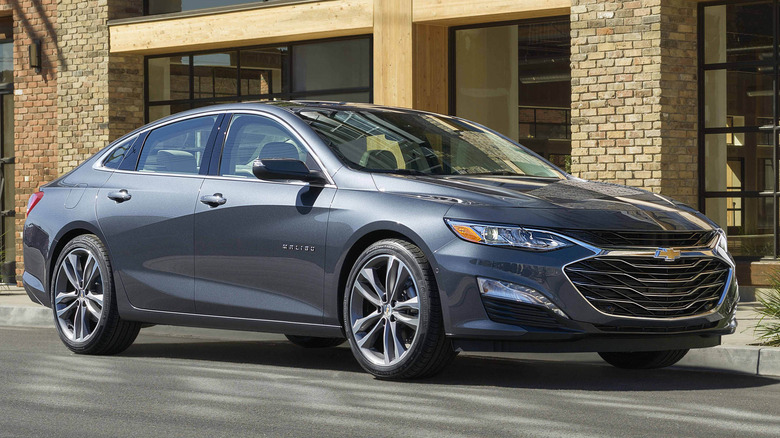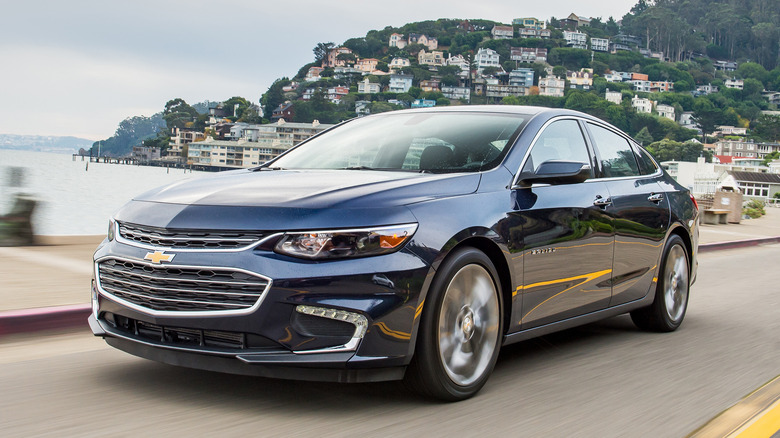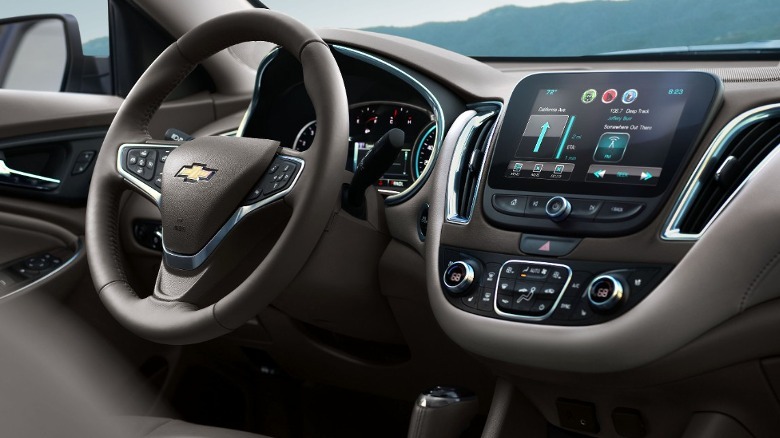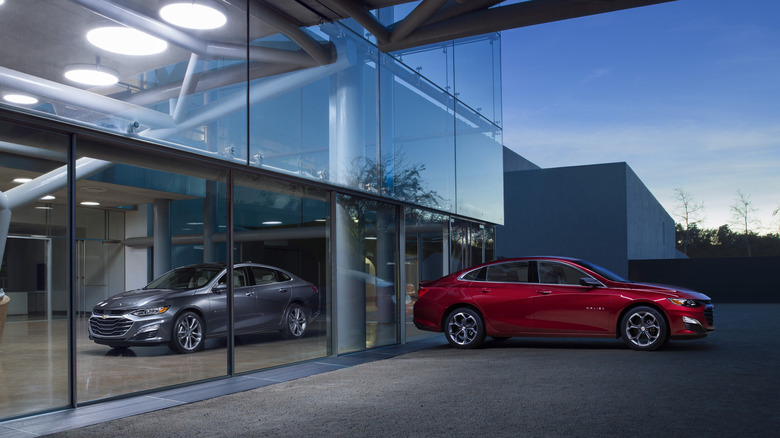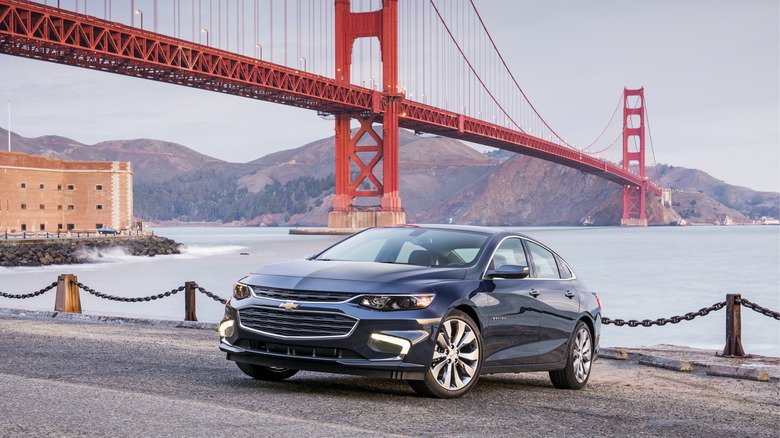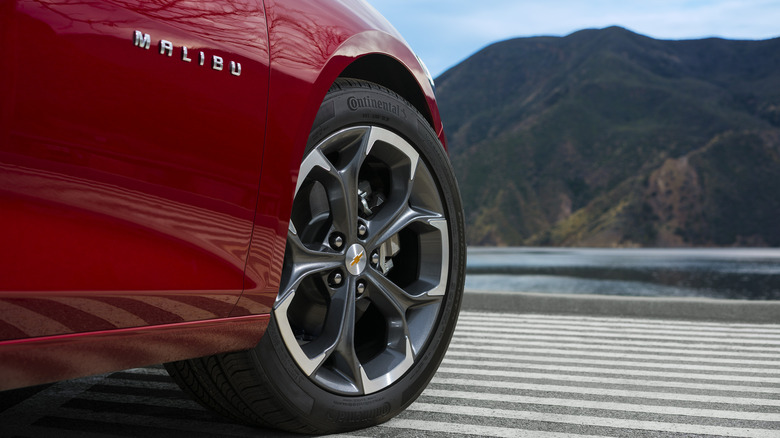The Chevrolet Malibu Was A Good Car And No One Noticed, Not Even Chevy
After a solid run of 60 years, the Chevrolet Malibu will officially be discontinued this November. Historically, the Malibu was one of the most recognized Chevy models and clearly people liked them as it sold over 10 million models over the years. However, the Malibu has faded into all but obscurity in recent years. 2019 was the most recent update for the storied sedan, leaving it hanging on for dear life for five model years before Chevy gave it the boot.
Despite what discontinuation implies, though, I don't think the Malibu deserves much ire. It was actually a fairly good car before being escorted off to the Great Used Parking Lot in the Sky. The final generation of the Malibu labored on stoically and in silence, seemingly until GM saw that it had forgot to flip the "Produce Malibu" switch off and start making more EVs that it had promised to make a number of years ago.
Surprising for 2016
The last generation of the Malibu started all the way back in 2016 and it was relatively feature packed and offered at a decent price: $22,500 for the base model, or$29,662 in today's money. You could trick it out as a Premier with a 2.0-liter turbocharged four-cylinder that pumped out a pretty beefy 250 horsepower; or, if you were more environmentally conscious, it was available as a hybrid the EPA estimated could achieve 46 combined miles per gallon.
By way of comparison, a Toyota Camry Hybrid from the same year could only get up to 40 combined miles per gallon. Six-miles per gallon better than Toyota, the King of Hybrids, is nothing to sneeze at.
The interior was excellent for a 2016 car, and downright futuristic for a Chevy. Heated, ventilated leather seats were available as well as an 8-inch infotainment system screen with Apple CarPlay and Android Auto. You could even outfit it with wireless charging pads. Frankly, ventilated seats and wireless charging pads are decidedly premium in 2024, yet Chevy had those on the Malibu eight years ago. It was forward thinking and Chevy probably didn't even know it at the time.
It wasn't the time or place
No one is going to say that the Malibu was absolutely ground breaking or that it shattered ceilings for what a midsize sedan could be. But it was incredibly competent and well executed. The target audience just didn't seem to care enough to keep the Malibu alive.
You wouldn't expect an Iron Maiden show to go well at a Hank Williams tribute concert, because while there's nothing wrong with Iron Maiden or Hank Williams, the styles just don't match. Similarly, there's nothing wrong with the automotive tastes of the public and there wasn't anything wrong with the Malibu, it just wasn't the time or the place.
Chevrolet only cared enough to make changes to the Malibu up until 2019, and then seemingly forgot about it in favor of electric cars. The Impala — these days entering modern classic territory — suffered the same fate. Now the plant is getting gutted of anything Malibu-related in favor of the Ultium future. It wasn't personal, it was just business.
The market decides
The Malibu managed to combine a good price with practicality and a genuinely good feature list, into a package that would presumably not cost very much to insure (spicier drivetrain regardless, the Malibu doesn't exactly invoke images of irresponsible, pedal to the metal driving). Even today, in the Crossover Universe that we find ourselves in, the Malibu would probably be a fine car for a large portion of drivers on the road. Problem is, as Ford and others discovered, customers tend to buy things for the image they exude, rather than practicality.
People flock to SUVs, when they might be equally — or better — served with a minivan or just a station wagon. Of course, it's not uncommon for automotive journalists to tell people they should buy more wagons and minivans, just like it's not uncommon for people to ignore the advice of automotive journalists. All that said, the Malibu could have fulfilled a lot of automotive needs, but Chevy didn't seem to realize, and the market didn't care.
Too late for the Malibu
For the very last year of the Malibu, 2024, Chevy dropped all of the interesting powertrain choices (the hybrid and the 2.0-liter), in favor of a 1.5-liter turbocharged four-cylinder paired with a CVT. 30 combined miles per gallon and a new color choice aren't too bad, but it's a far cry from its optimistic former self in 2016. We've already covered how good of a deal the Malibu is compared to its peers, but you can tell Chevy has been trying to turn off the lights and lock the door on the Malibu for a number of years. At least it can say it hung on longer than Ford's passenger sedans.
Not only are market trends cruel, the ever encroaching march of Ultium-powered electric cars tends to take no prisoners, and the Malibu is victim to both seemingly unstoppable forces. It's not a surprise, really, that the last sedan in Chevy's lineup is going the way of the dodo, it's just a little sad that it happened to be the Malibu, a car that seemingly no one noticed until it was too late. Requiesce in pace, Chevy Malibu.
